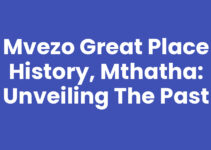Mthatha, located in the Eastern Cape province of South Africa, often sparks discussions regarding its geographical and cultural significance. The question Is Mthatha In The Transkei? prompts inquiries into the relationship between Mthatha and the historical region of Transkei.
This blog post aims to explore this question thoroughly, providing insights into Mthatha’s location, historical context, and cultural importance, making it a valuable resource for anyone interested in South African geography.
Is Mthatha In The Transkei?
Yes, Mthatha is indeed located within the Transkei region. The Transkei is one of the former Bantustans established during the apartheid era, designed to segregate the black population from the rest of South Africa. Although the political landscape has changed since the end of apartheid, the cultural and geographic implications of this history are still very much alive in Mthatha.
Mthatha is situated approximately 20 kilometers from the Indian Ocean coast and serves as a significant urban hub in the region. Historically, it was known as Umtata and was a vital administrative and economic center for the Xhosa people, one of the prominent ethnic groups in South Africa. Its significance was further amplified with its designation as the capital of the former Transkei.
When exploring Mthatha, it is essential to recognize its multifaceted identity. The town is enveloped by stunning landscapes that showcase the lush vegetation typical of the Transkei. From rolling hills to winding rivers, Mthatha not only serves as a critical urban center but also as a gateway to experiencing the rich natural environment of the Transkei.
To answer the question directly: yes, Mthatha is in Transkei, and its historical roots and present-day significance make it a remarkable place worth exploring.
Related Guide: Booking A Tour Guide For The Mandela Route, Mthatha
The Historical Context of Mthatha and Transkei
The history of Mthatha is deeply intertwined with the broader historical narrative of the Transkei. Before the establishment of the Bantustans, the area was predominantly inhabited by the Xhosa people. In the mid-20th century, apartheid laws led to the creation of the Transkei as a separate political entity, resulting in considerable challenges and changes for its inhabitants.
In 1976, the Transkei was declared an independent homeland by the South African government, although this independence was not recognized by any other country. Mthatha became known as the capital, which led to the development of infrastructure and governance structures tailored to serve the local population.
Even after the abolition of apartheid, Mthatha has remained significant as a cultural center. It is home to many educational institutions and serves as a conduit for several socio-economic developments within the region. Understanding this history enriches our appreciation of Mthatha and helps contextualize its importance within South Africa.
Recommended Guide: Explore Bird Watching Clubs Or Guides In Mthatha Today!
The Cultural Significance of Mthatha Today
Modern-day Mthatha embodies a dynamic blend of cultures, reflecting both its historical roots and contemporary influences. The town is known as a center for Xhosa culture, with traditional ceremonies and festivals being integral to community life.
Mthatha plays host to various cultural attractions, including the Nelson Mandela Museum, which honors the legacy of South Africa’s first democratically elected president. The museum seeks to preserve and celebrate the history, culture, and contributions of the Xhosa people and the ongoing struggle against apartheid.
Additionally, Mthatha is a thriving marketplace where local artisans display their crafts, ranging from intricate beadwork to finely woven mats. The strong emphasis on community and tradition is palpable, providing both residents and visitors with a profound understanding of Xhosa heritage.
For tourists, Mthatha serves as a gateway to explore the greater Transkei area, which is famous for its beautiful coastline, hiking trails, and cultural experiences in the surrounding rural villages. The region offers breathtaking landscapes that, alongside Mthatha’s urban charm, create a unique setting that resonates with nature lovers and culture seekers alike.
Conclusion
In summary, Mthatha is undoubtedly a part of the Transkei, and its significance transcends geographic boundaries. With a rich history and vibrant culture, Mthatha stands as a testament to the resilience and identity of the Xhosa people. Whether you are interested in exploring its scenic beauty or its deeply rooted cultural heritage, Mthatha offers an enriching experience for all.
Check This: Drive From Mthatha To Cape Town: A Complete Travel Guide
Frequently Asked Questions
What is the relationship between Mthatha and Transkei?
Mthatha is located within the Transkei region and serves as its capital, historically significant for the Xhosa people.
Is Mthatha a good place to visit for cultural experiences?
Yes, Mthatha offers rich cultural experiences, including the Nelson Mandela Museum and local Xhosa traditions.
What can I expect when visiting Mthatha?
Visitors can enjoy stunning natural landscapes, cultural attractions, and a hospitable community eager to share their heritage.









